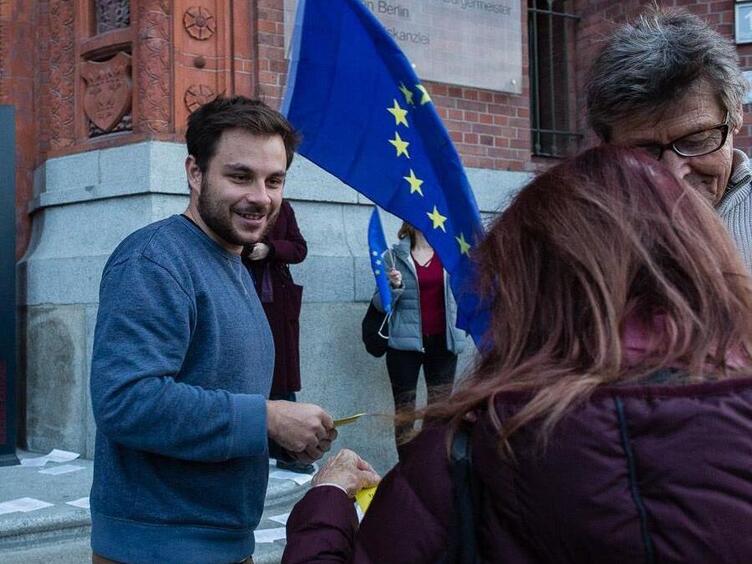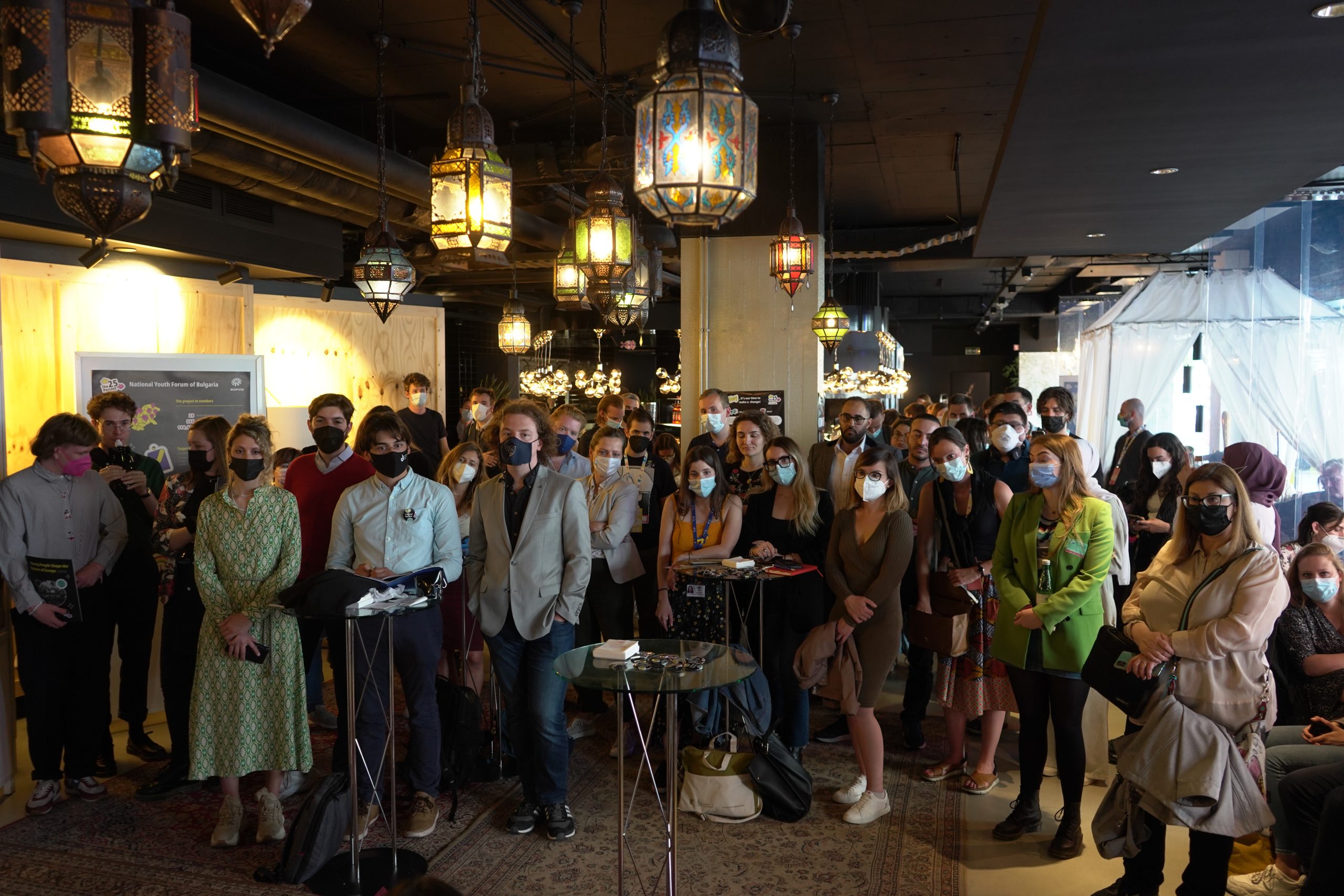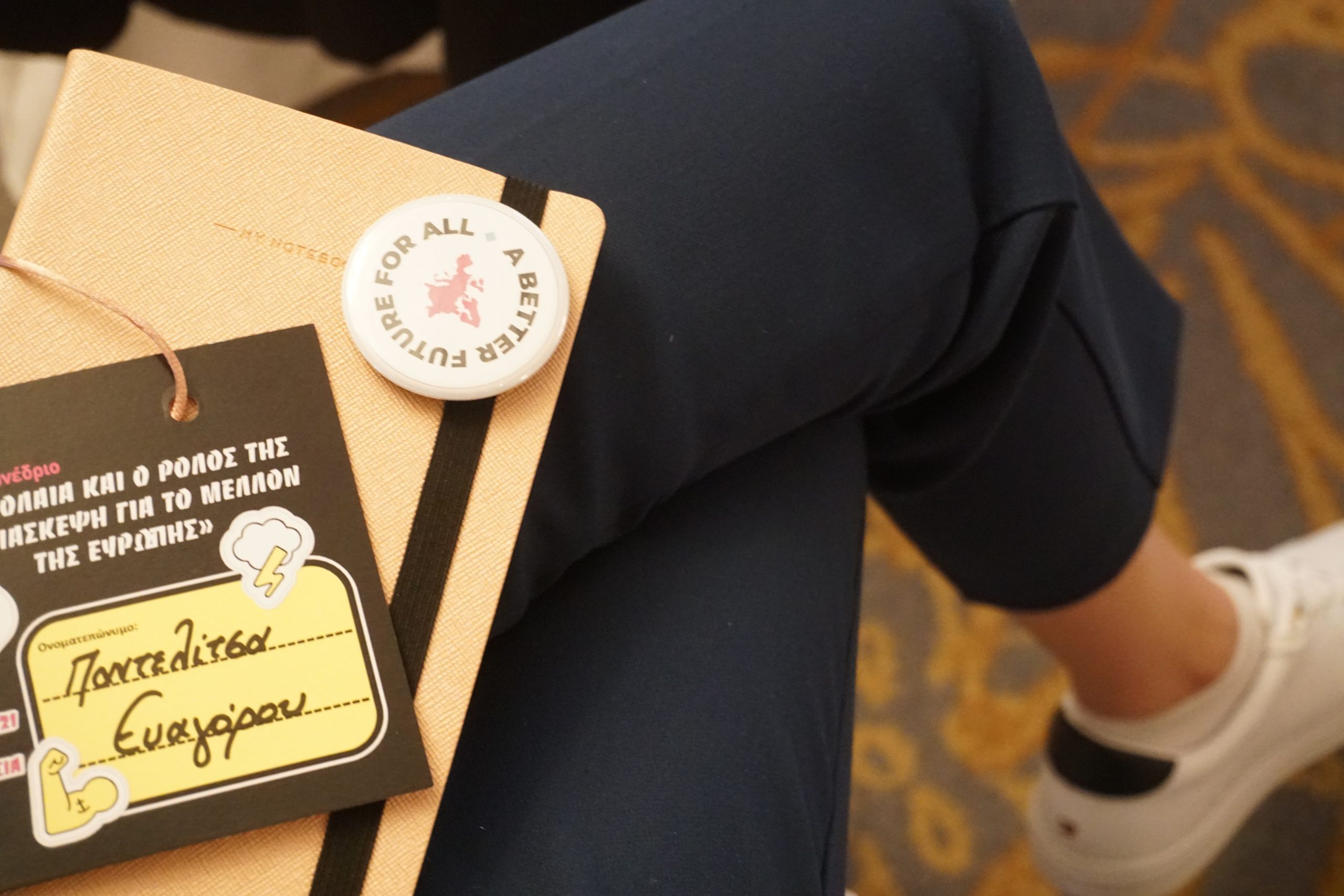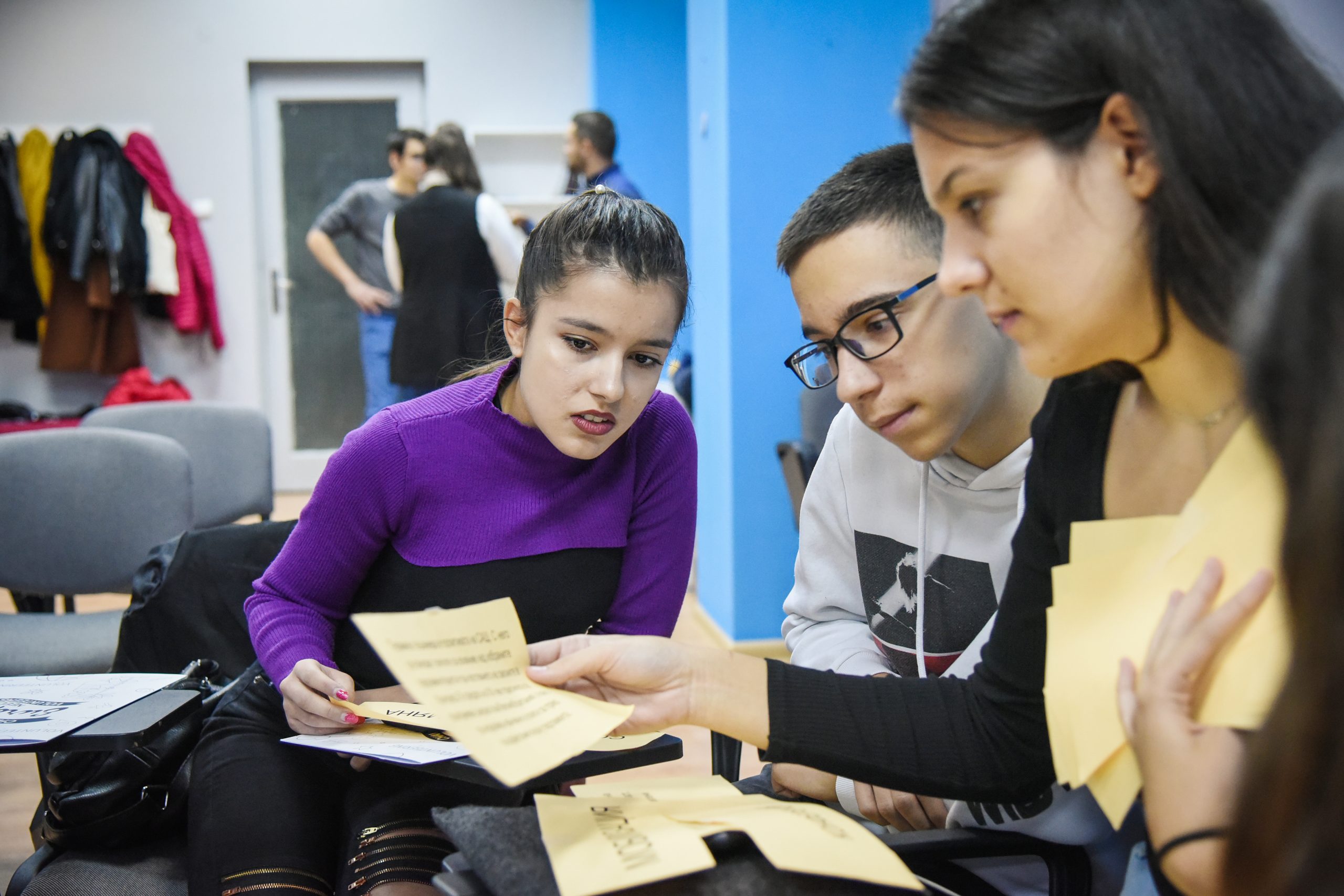Marius Schlageter: Youth is a marginalised age group
Today we had the pleasure to meet Marius from Germany. Marius is Vice President of the Federal Youth Council, a board member of The European Movement Germany and a Master student. Marius studied also in Brazil and Portugal, where he worked in a call center. That experience, among many others, led him to realise that something had to change.
Q. Hi Marius! Nice to have you here! Would you like to introduce yourself and tell us something more about what you do?
Sure! Well, I am Marius, I am from Germany, I am vice president of the German Federal Youth Council and spokesperson of DNK, which is a member organisation of the European Youth Forum. What I do, well, basically me, together with all the people in our Youth Council and the youth organisations within our Youth Council, represent the interest of both our member organisations and the 6 million members which we have. So, we try to represent the voices of young people in Germany towards politics, society and decision makers in general. In short, we fight for the interests of young people.
Q. That is cool, it also seems quite complicated! How did it happen that you found yourself involved in youth representation? Does it have to do with your academic background?
Mmm, I do not think that my academic background was determinant. I did my bachelors in Germany and I studied political sciences and Portuguese studies. Therefore, I spent some time in Portugal and Brazil, and now, for my masters I am doing “Peace and Conflict” studies. I became involved in the youth sector when at 10 I joined the scouts. At 16, I became a troop leader, so I was organising meetings, summer camps, international youth exchanges, etc. So, at some point I became involved at the national level, in the international team. We were organising international contacts for our local groups, so that they do international youth exchanges, and meet people from all over Europe and even the world, as the scout is a global movement.
Q. And then what happened?
What happened next was that I saw an open call for a youth representative for the Structured Dialogue (now EU-Youth Dialogue) opened by the German Federal Youth Council. In this role, I started to know all the people in the youth sector across Europe, the people in the ministries, and I got to learn all the opportunities, but also all the frustrations that come with youth participation. I was frustrated because we were tokenized a lot. I thought that all the problems with the youth dialogue were rooted in its structure, so I applied because I wanted to change them, and if you want to change the structures, you need to get involved with them. A way to get in was the German Federal Youth Council, so I asked my organisation, the Scouts, to support my candidacy to become vice-president of the German Federal Youth Council. They said yes, so two years ago I ran for the post, luckily I got elected, and since then I am involved in both the national and international level of youth participation.
Q. I feel you just summed up 10 years of your life in two minutes! But maybe you can tell us more about the EU-Youth Dialogue, what is that?
So, the EU Youth Dialogue is the EU most relevant mechanism for youth participation in Europe. It brings young people from the local, regional and national level together with decision makers from the local, regional, national and European level. What we do is to organise events all over Europe (each country organises its own) where we talk about common issues, identified by young people beforehand, so for once, we set the agenda. This is what we did with the 11 youth goals, including mental health, good education, social security, gender equality, you name it. Then we go to all the places over Europe, discuss these issues, gather demands from young people, and then we have EU Youth Conferences, which happen once every 6 months, where we bring our demands to decision makers to make them understand what we need and how our needs can be addressed. Sometimes it works, sometimes it does not, but it takes a lot of effort on our part and what I have seen is that, at least in the youth sector, a lot of those people working in ministries, European Commission and Parliament are eager to support us and are on our side. So, it is a moment of hope where we see a lot of good collaborations: it is all about making it as impactful as possible.
Q. You have talked about bringing the voices of young people to decision makers, but how do young people make their voices heard? Meaning, how do you gather their input?
There are two main ways: one is representation. So, we work with youth organisations from all levels democratically. For example, each local group elects a leader, these representatives meet at regional level, and discuss. Then, the regional level brings up the demands at the national level and so on and so forth. The other is participation, which is a way to get young people on a fast lane to the national and EU level, and that is another opportunity to be heard.
Q. So it is a bit of a subsystem of representative and participatory democracy… but how did it happen that you “discovered” this EU dimension?
In 2012 I was living in Portugal and I was working in a call center. 2012 was a particular year as Portugal was suffering a lot from the consequences of the economic and financial crisis of 2008. That was the time when I saw a lot of my friends suffering these consequences: unemployment rates were very high, and there was this general feeling of not being able to shape our future. You could feel a sense of despair even. Then, I understood a couple of things: the first was that we as young people are a marginalised age group: our interest and needs matter less than other age groups, and this for different reasons. One of them is demographics: in many countries young people have less access to the democratic life due to voting age laws, so there are less voters than other age groups, and we cannot run for elections, then we have less economic power etc.
Q. And what was the second thing that you realised besides that young people are a marginalised group?
I realised that there was an European dimension to this problem, because when I came back to Germany, also there young people were not doing fine: in Germany 21% of youth lives in poverty, all young people in Europe, compared with other age groups have a worse mental health, then there is the issue of gender equality, gender identity, sexuality, which for some people is a political problem. Then there are the consequences of climate change, which will impact more heavily on younger generations. So, beside realising that we were a marginalised age group I also realised most of these issues are European, if not global issues. So, I understood that, if I wanted to find solutions to these problems I had to find solutions, at least, at the European level. Individual nations alone cannot solve these problems: Portugal, France, Italy, Poland, Germany etc will not solve the issue of youth unemployment alone, as they are part of the single market, and are influenced by international economic developments. This is why I wanted to be at the European level: because I thought that would be the place where I could have more impact.
Q. Do you still believe so?
This was my thinking when I got involved, and it is still an amazing experience. These issues feel huge, massive, unwinnable, when you talk about the climate crisis and youth unemployment, you look at the little progress in the last 10 years, and the general worsening due to COVID-19. So, it can be really overwhelming, but then, you meet a lot of amazing people, a lot of idealists, putting a lot of passion, energy, time, fighting your same fights, and suddenly you do not feel alone anymore, you feel empowered because there are hundreds, or thousands and millions of people fighting the same fights. And this is very rewarding.
Q. We have spoken with other young people and many of them have chosen other ways of fighting their battles: some are doing campaigns, social media awareness, some are involved in grassroots movements etc. You decided to use the structures already in place to make people’s voices heard, but it looks like it is not the primary choice anymore: how do you see the complementarity of different types of participation and why did you choose this?
In 2018, I was also a grassroots activist. Me and some friends thought we had to do something on the occasion of the European elections: European values in many places were disregarded or openly under attack, while we felt we needed more Europe, an Europe which is more capable of solving issues. So we organised a transnational grassroots movement called the European May. We proclaimed the European May, which was a whole week of activism across Europe without a single euro of budget. We had 50 actions in 14 countries organised by passionate people.
It was about the same time I decided to work more with structures. At the end, you need them: if you want to organise people in big numbers, you need a structure for decision making, information, transportation, representation. At the end, it all comes down to putting structures in place. So, I decided to engage with the structures and leave maybe some legacy to other generations to come. Most of the time, what we call ‘structures’ and what we call ‘grassroots’ are very interlinked. For example, Fridays for Future in Germany was massively supported by youth organisations, offering them spaces for example, and if you go on a strike, you see many familiar faces. So, at the end they go hand in hand.
Q. The Conference on the Future of Europe is perhaps an example of this… What are your thoughts on it? What is the role of young people in it? How do you want to engage in it?
I truly believe it is time to have a sincere discussion on the future of Europe. The EU we have does not seem capable of solving the pressing issues we have, to not even mention defending the values we gave ourselves: democracy, freedom, rule of law, human rights, minority rights, human dignity. You can see that at our borders, in how LGBTQIA+ people are treated: some states went to the point of declaring some zones LGBTQIA+ free zones. Most of the reasons why the situation is what is it, is rooted in the structures of the EU, the Treaties and how it was established, the division of competences, who is involved in certain discussion and who is not etc, and sometimes, among those who are excluded is the European Parliament, the representation of citizens, and who has a lot of the power is the Council of the EU, the Member States. This creates a strange dynamic: we need to find EU solutions to global issues, but sometimes, national egoism blocks these solutions. That is why it is important to have this discussion. Regarding the Conference itself, it is great that it will provide the space for the discussion for people from all over Europe. At the same time, we are not so sure how much of an impact it will actually have, where it will lead us, and what the concrete output, if any, will be. We, civil society, need to keep everyone accountable, and push for concrete results, and push the European Commission, the European Parliament and the Council of EU to take seriously the outputs of the Conference, and then maybe have a Convention for a Treaty change.
Q. Indeed, this is the time to put pressure, and we only have one year, so, it is really the moment to mobilise… talking about this, what are you especially proud of your work as an activist?
Can I say 2?
Q. Sure, go ahead!
One is at the EU level. So, Germany had the presidency of the Council, in the trio with Portugal and Slovenia. The EU Youth Dialogue is steered by the trio. So, we managed in the past year and one half to make the dialogue more meaningful, by building a lot of trust and relations, while agreeing on common principles, common plans, aligning our ideas, eventually coming to a common idea. I am very proud of this, because we changed a bit the structures of the dialogue. The other is from the national level. With the COVID regulations, in October 2020, all regions in Germany decided to allow only people to meet only one person outside of their household. That meant that people at the age 6 or 7 could not see their friends, because they could not go out alone.We met the Minister and we said that if every citizen could meet at least one person, it was unfair that young people who cannot go out alone had to stay home and not see their friends. So, the next week the Ministry decided to make an exception for people under 14. It was a minor action, but it had an impact for all the people under 14 in Germany. I am sure they did not want to discriminate against us, they just forgot about us. This is why we need to step in and make sure that young people’s needs are represented.
Q. Thank you a lot for this Marius! Sadly, we have to part for now, but I hope you will be back at some point!
Sure! Why not!



